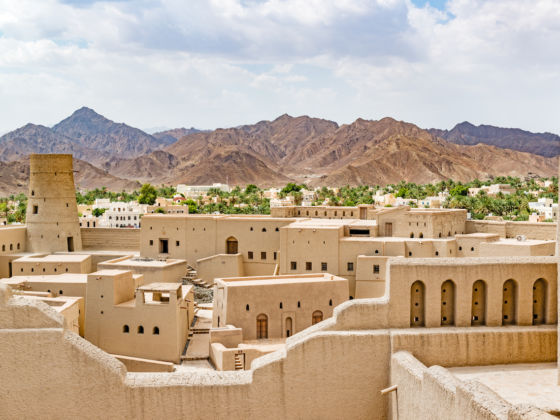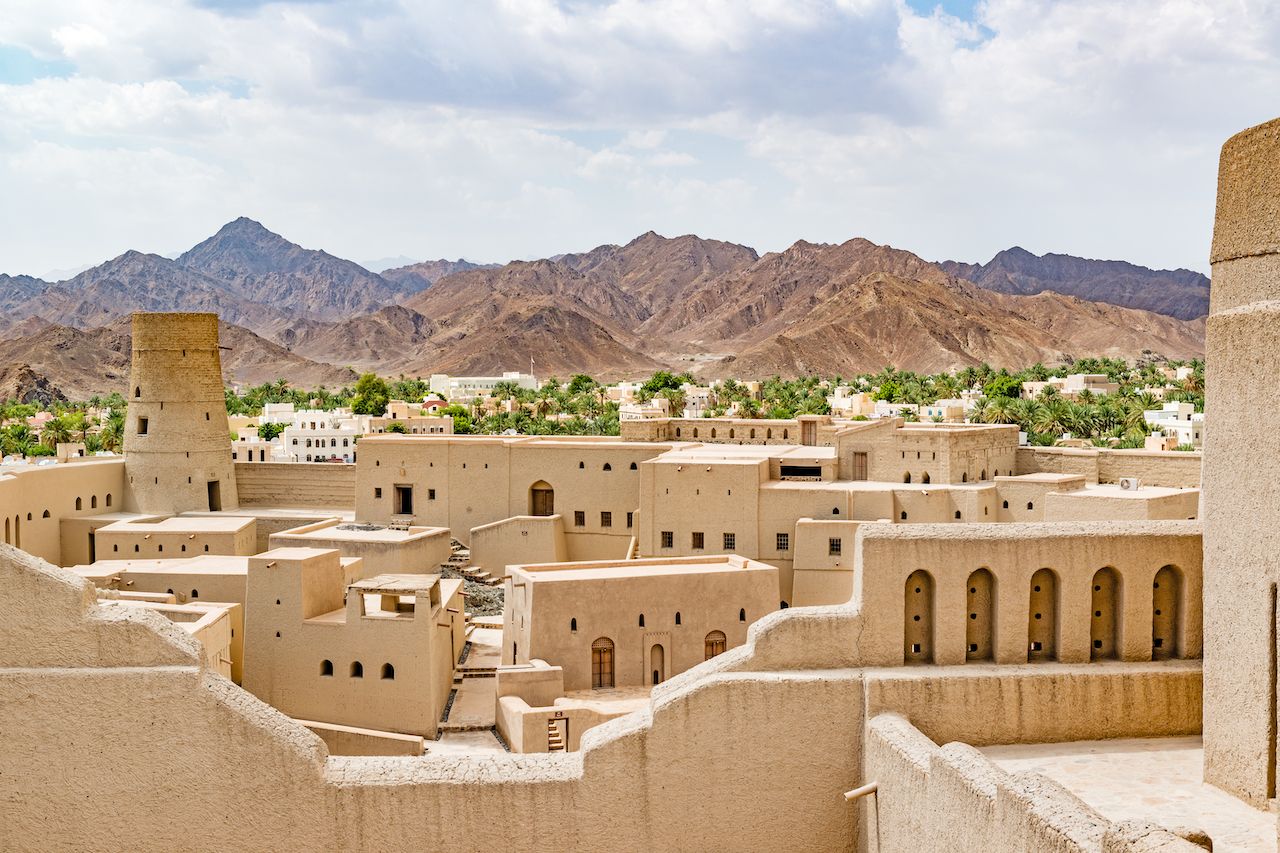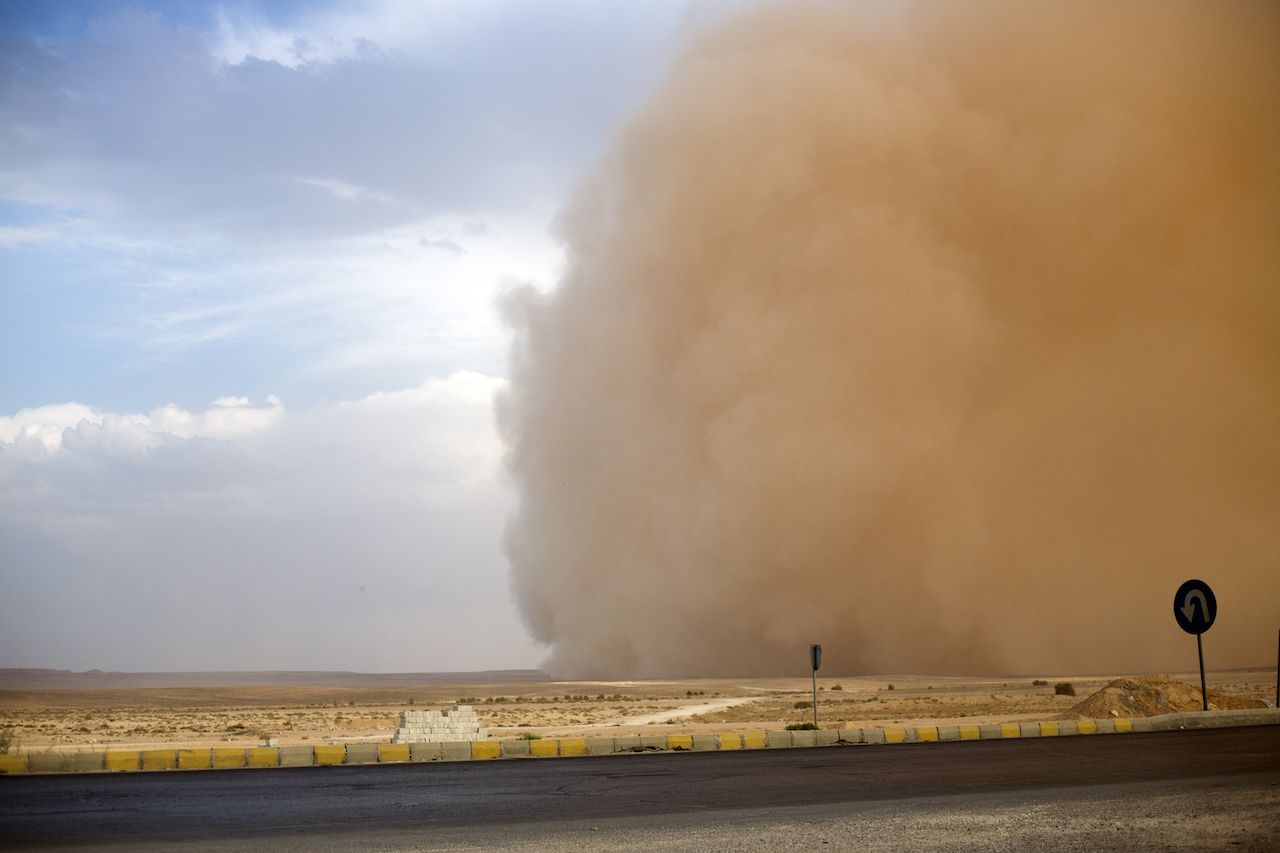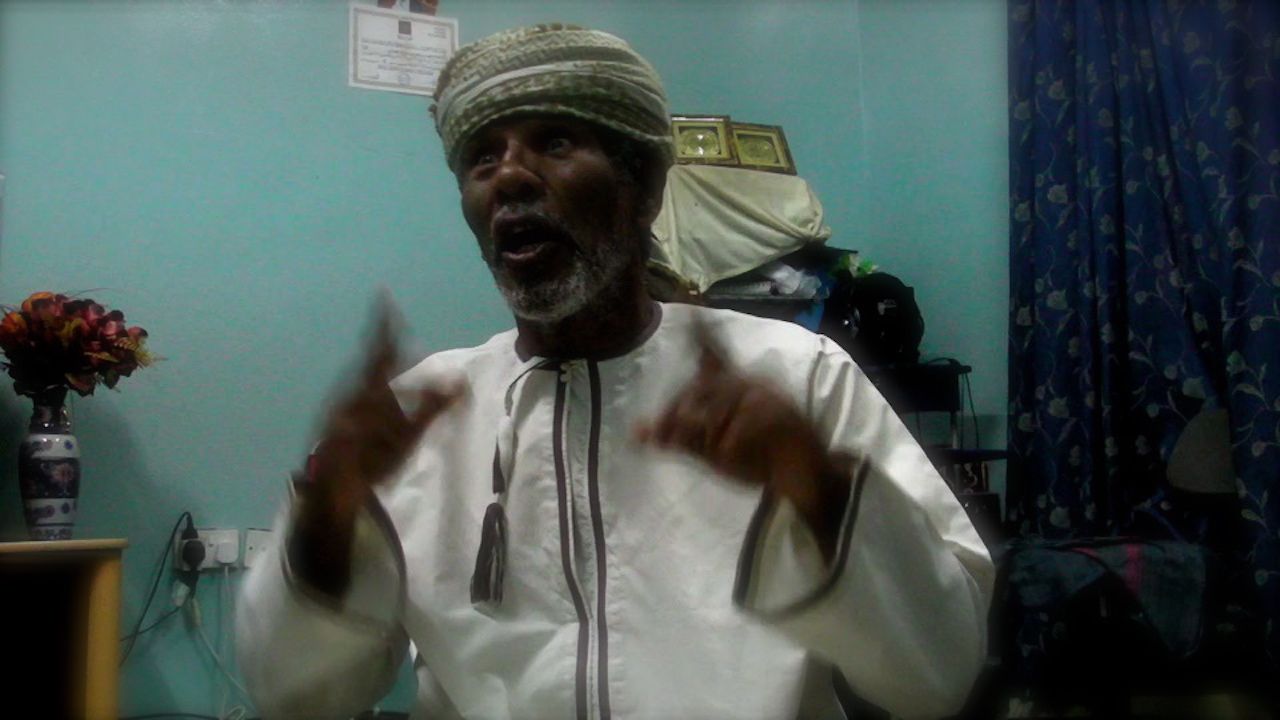If you think sorcery is dead and gone, a trip to the Arabian Peninsula — where people are still charged with this crime punishable by prison, lashing, and sometimes death by decapitation — is very much in order. While Saudi Arabia has an anti-witchcraft unit of the religious police, the longstanding epicenter of all things that go bump in the night — including, genies, exorcisms, and voodoo — is the Sultanate of Oman.


What It’s Like to Experience a Genie Exorcism in Oman
Historically, Oman was a slave destination country. East African slaves brought their voodoo practices with them, which mixed with the pre-Islamic, polythestic belief in spirits called jinn, or genies as they are known in the West. When these beliefs collided with Islam, the legend of Bahla was born.
Bahla, Oman, is the Middle Eastern version of Salem, Massachusetts. In 2014, Bahla even made it into National Geographic’s list of the top 10 most haunted cities in the world. Living just down the road from it in Nizwa, in 2011, I penned an article for Matador Network about a famous Islamic exorcist who lived there, Moalim Salim. He claimed to have helped more than 5,000 people dispel jinn that had possessed them.
Shortly after the story was published, I received a message from a young woman who said, “I am an American — live in Boston — and have a jinn problem (and I am not crazy).”
She had done ruqya, an exorcism, already in the UAE, but the jinn possession continued, so she wanted me to fix a meeting between her and Moalim Salim as soon as possible. Despite my initial reluctance, my curiosity won out, and I agreed to make the necessary arrangements.
A month or so later, just on the other side of customs at the Muscat International Airport in Oman, I wait for my possessed guest with a cardboard sign displaying her name.
For her, this is a trip to find salvation. For me, an English teacher who could be deported at any time for any reason with no legal recourse, this is a huge risk. In the Gulf Cooperation Council states of Saudi Arabia, Kuwait, the UAE, Qatar, Bahrain, and Oman, people are not deported but rather imprisoned or even beheaded for dabbling in witchcraft or sorcery. A gawing pit of anxiety starts to sours my stomach.
A glimmer of recognition — she’s spotted my sign. Dark circles and bloodshot eyes tell the tale of a 12-and-a half-hour marathon flight from Boston to Muscat across eight time zones.
Amid the cacophonous flight notifications, I shake her hand and make an announcement of my own. “You don’t look like you’re possessed by a jinn,” I say, hoping to break the nervous tension as we weave our way towards the airport exit.
Arching an eyebrow, she replies, “And you, don’t look like an alcoholic.”
It’s my turn to be taken aback. I manage to smile awkwardly as we cross the line of orange and white Omani taxis outside, their drivers swarming in on us. In their national dress of dishdashas (starched white shirt-dresses) and kumas (brightly embroidered caps of Zanzibari origins), they’re eager to plunder unsuspecting tourists with exorbitant taxi fares. With a few “la, la, la shokran”, they return to the red, no-parking curb.
Interpreting the puzzled expression still lingering on my face, she explains herself, “I read your story, Notes from an ex-alcoholic skateboarder, on Matador Network.” Remembering it, I smile and nod in appreciation. I toss her luggage in the back of my blue KIA Picanto, an economy car that feels like an oven on wheels today under the Arabian sun. In the distance, an ominous dark cloud is brewing over the mountains that frame Muscat.

Photo: Philip Lange/Shutterstock
Buckling her seat belt, she asks, “Moalim Salim is going to be there, right?”
“Inshallah,” I say, switching on the AC full blast, hot air blowing in my face. “He didn’t pick up the last time I called though.” Even from a profile view in my peripheral vision, I can see her jaw tightening up.
I stiffen up as well as we cross over the six lanes of Sultan Qaboos Street, Muscat’s main thoroughfare and an incredibly dangerous road network. But with vehicular manslaughter on my mind and a sandstorm brewing in the hills, we hit the road to pick up my Omani friend Hamed — our Arabic translator — for a potentially illegal exorcism that could get us all killed.
Ascending into the foothills via the Muscat Expressway, the Indian Ocean comes into view — an infinity of blue stretching into the southern hemisphere. It stands in stark contrast to the cloud bank building over the mountains. With the eyes of the newly arrived, she takes in the scene — sepia-colored peaks, alabaster cities, a cerulean sea, and a sandstorm brewing on the northern rim.
Rolling into Bowshar Heights, a haphazard neighborhood of manorly villas and apartment buildings on unnamed streets overlooking Muscat, I toot the horn in Hamed’s dirt driveway and give him a missed call. The wind is picking up, dust pelting the car.
He slips out the villa’s side entrance, puffing a cigarette in one hand and a tiny, plastic cup of Arabic coffee in the other. Taking one more drag before he jumps in the backseat, he flicks the smoke in the adjacent lot, slurps the rest of the coffee down, and tosses the cup to be blown away by the wind.
“That’s Hamed — always thinking of others,” I say to our guest, trying to make light of my embarrassment for his flagrant littering. Sand pummels him as he plops into the back seat. He reeks of Marlboro Lights.
I introduce the two and soon we’re winding our way up Ghala Street, the backroad through Falaj Al Sham to Highway 15. It will take us across the Hajar Mountain Range to Bahla for a close encounter with the occult and straight into the dark-brown cloud bank rolling down the mountains.
Whizzing by outside, white villas become fewer and further in between spindly clusters of ghaf trees, clinging desperately to rocky hillsides. With high speed winds now gusting unexpectedly and the light of day being blotted out by the imminent sandstorm, my crackerbox of a car is getting battered around violently. Gripping the steering wheel tightly, I switch on the lights for safety.
She turns to look at me, eyes wide with alarm, yet asks calmly, “Are we going to die?” Laughing a little too quickly, I catch Hamed’s eyes in the rearview mirror for a second and defer to him. He pulls himself up between us.
“La Qadarah Allah — God forbid, only a sandstorm,” Hamed replies automatically. The color in her cheeks has gone. “They’re dangerous but not deadly if you don’t do something stupid like drive through them,” he says looking at me. She looks away, out the dirty window. It’s getting darker. Sand blowing across the road like waves lapping at the coastline.
She turns to Hamed, “Have you talked to Moalim Salim recently? And how do you two know each other anyway?” She asks, suddenly suspicious. Turning now onto Highway 15, there’s a spattering of rain — fat drops dirtying the windshield. I flick on the wipers.
“I’ve never actually talked to the Moalim,” Hamed replies, “And this dude,” he says tapping me on the shoulder, “I met him in a 12 Step Meeting in Muscat. But I’m not an alkie like him; I’m a junkie,” he announces. Raindrops make pinging sounds on the car.
Glancing at her, I can’t resist teasing a little, “Hamed doesn’t look like a heroin addict, does he?” A sheepish, lopsided grin dimples her cheeks.
“You don’t look like an alcoholic, he doesn’t look like a heroin addict, I don’t look like I’m possessed by a jinn, and we’re all going to die together!” She blurts out, seemingly overwhelmed by the absurdity of the situation. “Tell me you don’t mind if I smoke,” she says, fumbling around in her purse for her cigarettes. She cracks her window, and the earthy aroma of rain mixes with the sour stench of her smokes. The craggy outline of the Hajar Mountains now just barely visible outside as we head deeper into the storm.

Photo: Ahmad A Atwah/Shutterstock
As the wipers on my car go back and forth furiously to mix the dust and spattered rain on my windshield into mud, I nudge our way up the Sumail Gap, the dividing line between the Eastern and Western Hajar Mountains. Visibility has dropped to just about 150 feet.
“So you have a jinn?” Hamed asks her as we summit the mountain pass. Nodding, she ashes her cigarette out the dirty window — rain splattering her black leggings. “One time in rehab there was an Omani guy there who had a jinn inside of him too,” Hamed continues. She turns to face him, inadvertently blowing smoke in our faces before trying to wave it away with her hand. “We were in group, and he just suddenly fell to the floor and started convulsing, wallah. We were shocked, but then someone thought to lay on top of him and then we all just hugged him until he stopped shaking. When khalas he stopped, this old Arabic came out of his mouth, and his voice was not his own. At that point, some of the shabab lost their shit and ran from the room. Wallahi it was heavy!”
A flow of brown water rushes through the wadi, the normally dry wash next to Highway 15, as we pass by. Local children have come to the edge of the date palm oasis in their village to watch the rising floodwaters.
“Most Muslims believe in jinn and what they’re capable of even though they are just pagan beliefs integrated into our religion,” Hamed says.
“But culturally speaking, the Arab mindset is suspiciously superstitious in that the first thought when something unfortunate occurs — someone falling ill, a reversal of fortune, or what have you — is that it is either the will of Allah or the evil eye. In either case, reciting Quranic verses are highly recommended, right, Hamed?” I ask touching the nazar, the blue-eyed talisman hanging from the rear view mirror that my Syrian wife’s grandmother gave to me against this type of sorcery.
“Iwa. It’s why we always say mashallah or tabarakallah after a compliment. It’s protection against the evil eye. It means, “God has willed this for you, blessings be upon you, and I will not envy you because of it,” Hamed explains as we arrive at Moalim Salim’s mini-castle.
The sky directly above is surprisingly clear, but a dark, inauspicious cloud clings tenaciously to the mountains surrounding us — static electricity lighting it up in flickers of blue. We’ve entered the eye of the storm.
We knock on the great wooden doors of Moalim Salim’s home and hold our breath in wait. If he’s not here, then this perilous journey will have been nothing but a fool’s errand.
A stirring of echoes, someone (or something) shuffling about inside, the lock turning, catching — the door creaking open, “Asalm alekum!” The Moalim announces, smiling broadly as if expecting us all along at this exact moment. We all breathe a collective sigh of relief that he’s actually here. Dressed in the traditional Omani garb, he cuts an imposing, if not wizardly, figure. Beckoning us into his majlis, he welcomes us with tiny cups of cardamom-flavoured Arabic coffee.
On the table in the middle of the brightly lit room are his hajahs and hars, the amulets he uses to exorcise jinns. Hamed’s eyes go wide when he sees them, flashing me a look of alarm. He’s concerned because any Islamic exorcism that uses an amulet or talisman in the ceremony to dispel a genie is strictly haram, or forbidden, because it associates partners with Allah, which, according to Shar’iah Law, is ipso facto polytheism. It’s the kind of stuff that will get your head chopped off.

Photo: Baxter Jackson
With reverence, the Moalim carefully opens this book, a thick tome made of delicate rice paper with intricate diagrams and charts scrawled in Classical Arabic. Cross referencing the alignment of the planets and stars with the time, I contacted him with her birth sign — it’s all just a matter of balancing the four elements of earth, wind, air, and fire. “When they’re out of balance on Earth,” he explains, “natural disasters occur, and as it is on Earth so it is with those Allah made of clay.” The roll of thunder in the distance is right on queue. She breathes in deeply. This is the moment she’s been waiting for.
In the bright neon lights of the room, a shadow suddenly races across the walls of the majlis — indecipherable whispers echoing in its wake. We gasp collectively and Moalim Salim declares, “Al Malak Al Aswad! The Black Prince of the Jinn!” Hamed starts chanting the Fātiḥah, the opening of the Quran, rocking back and forth. I look at her. Her eyes are wide with fright; her skin is ghostly white.
There’s no time for wuduh, the ritual cleansing of the extremities. The moalim lights up the frankincense in the mabkhara, the shiny plated incense burner. Pushing the coffee table out of the way, he instructs her to lie down in the middle of the majlis, the sitting room. The sound of thunder grows louder, nearer. As he starts chanting the Mu’wadaitain, the last two chapters of the Quran, the fluorescent tubes flicker like the lightning over the mountains. He lays his bare hand on her forehead and begins the ritual.
“I seek refuge with the Lord of the dawn, from the evil of everything that He has created, and from the evil of the darkness of night,” the fluorescent lighting pops suddenly, and the AC goes dead silent. Undeterred, the Moalim lights a candle to continue the exorcism, “and from the evil of magicians, men and women, and from the evil of the envious.” Her eyes roll back into her head, the sclera of her eyes, the windows to her soul, glowing white by the candlelight. Hamed and I look at each other nervously.
A deep sigh escapes from her lips and with it a rush of cold air like the last breath of a dying AC. Moalim Salim continues, determined to finish the sura, “I seek refuge with the Lord of mankind, the King of mankind, and the Deity of mankind, from the evil of the whisperer.” She sits up suddenly, crying out, the thunder nearly drowning out her guttural, primal scream that fills the room. He steps back, motioning for us to quickly restrain her and lay her back down as he grabs a bottle of holy water from under the amulet table.
It takes all our force to push her back down to the floor. Another shadow shoots across the wall, its whisper flickering the candle. Sprinkling her with holy water, she winces, thrashing to be set free. The Moalim is defiant in the face of Al Malak Al Aswad, the Dark Prince, as he brings the surat al falaq to its climax. “He who returns over and over again,” he cries out, “he who whispers evil into the hearts of men, whether he be from among the jinn or men — be gone!” The thunder reaches its crescendo, a powerful blast rattling the windows.
I watch her fingers, curled into claws, release their grip slowly. The electricity comes back on — the AC humming out a cool breeze while a fluorescent tube, on the blink but not dead, flickers back to life. “Subhan Allah,” Glory be to God, Hamed says in wonder as we watch her eyes roll back to the front of her sockets, her breathing returning to normal.
Moalim Salim stands up, raising the withered palms of his hands to the heavens, saying simply and humbly, “Al-hamdu lil-lah,” thanks be to Allah. Hamed and I repeat the Islamic mantra, helping her to feet; her legs are wobbly, but her eyes are clear. We pay our respects to the Moalim as he gives her final instructions to keep the jinn at bay.
She’s a little weak still so Hamed and I help her into my car. While bright eyed, she looks disoriented. With the rain having settled the dust, everything looks different — the Hajar Mountains are sharper, the sky a deeper shade of blue, the sun more radiant.
As we get into the car — Hamed in the back and me in the driver’s seat — his eyes catch mine and he mouths, “WTF?” Shrugging my shoulders and widening my eyes in my defense, I plop down next to her.
“How are you doing?” I ask her as I put the stick shift in reverse and back out of the driveway. “I feel lighter,” she says nodding her head, “like a weight has been lifted off my shoulders actually.” A smile traces the corners of her lips, “But Goddamn, I need a fucking cigarette!” Laughter fills the car as we make our way on the road back to Muscat.
“Subhan Allah,” Hamed says, Glory be to God, as he pulls himself up between the front seats, closer to us, handing her one of his Marlboro Lights. I take one too and we all light up, cracking the windows.
“So do you think you’re cured?” I ask her as we pass a family of Omanis gathered at a wadi, a normally dry wash, full of coffee-colored rainwater by the side of the road.
“Inshallah,” she says, “but I did do ruqya before in Sharjah with a sheikh there, and just when I thought it was over, the jinn came back worse than ever.” She says slipping her cigarette into an old can rattling back and forth at her feet.
During the ride, we discuss what happened — the light flickering, the whispers, the shadows, her otherworldly strength, her piercing scream. None of us can explain what we witnessed. And none of us can figure out how we made it to the Moalim’s home without being blown away in a sandstorm, killed in a car crash, washed away in a flash flood, or even arrested for sorcery. We concluded that something made sure to bring us all together that day — an addict, an alcoholic, and a possessed woman — to defeat, for now, a genie in the Sultanate of Oman.
This sense of levity and camaraderie was, unfortunately, short lived. While the jinn was exiled for a spell thanks to her visit to the Moalim, the nocturnal visits by a malevolent presence returned with a vengeful intensity that scared her enough to travel abroad again, this time further east to Indonesia for an exorcism that would involve blood and maggots.